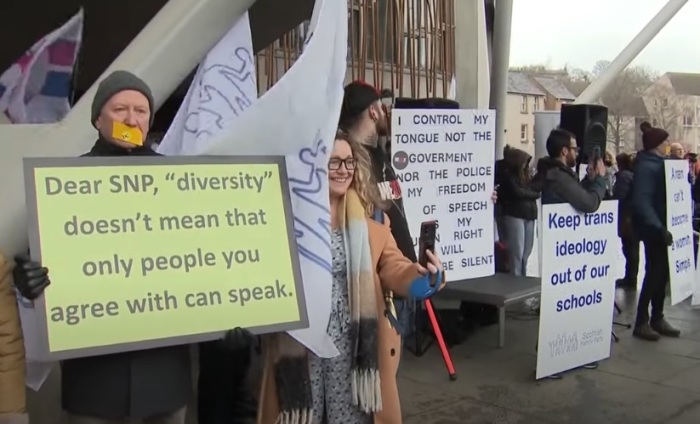Scottish Parliament considers motion to repeal hate speech law amid free speech concerns

Members of the Scottish Parliament have tabled a motion to repeal the new hate crime law that critics view as hostile to free speech.
The legal nonprofit ADF International announced in a statement Tuesday that an effort to repeal Scotland's Hate Crime and Public Order Act was tabled by the Scottish Parliament.
Originally passed in an 82-32 vote in 2021, the legislation took effect April 1. Since its passage, free speech advocates and critics have voiced concerns about the potential for the law to be abused to infringe on the freedom of expression.
Scottish police received more than 7,000 online reports of "hate crimes" in just one week after the law was enacted. Author J.K. Rowling was the subject of some complaints after she criticized the new law and called out biologically male trans-identified individuals on social media. Authorities will not bring charges against Rowling at this time.
One provision in the legislation establishes "offences of stirring up hatred." Violators could face up to seven years in prison or a fine.
Under the law, "a person commits an offence" by behaving "in a manner that a reasonable person would consider to be threatening, abusive or insulting" or "communicates to another person material that a reasonable person would consider to be threatening, abusive or insulting" and "in doing so, the person intends to stir up hatred against a group of persons based on the group being defined by reference to race, colour, nationality (including citizenship), or ethnic or national origins."
A person also violates the law if "a reasonable person would consider the behaviour or the communication of the material to be likely to result in hatred being stirred up against" groups of people based on their age, disability, sexual orientation, gender identity, religion or perceived religious affiliation.
"It's obvious that the 'hate speech ban' is completely unworkable according to democratic principles and must be repealed," said Lois McLatchie Miller, senior legal communications officer for ADF UK. "Scotland was once the Home of the Enlightenment, but these are dark days indeed for anyone willing to challenge the dominant forces of our day — either through edgy comedy, religious persecution or upholding the truth on biological facts."
Miller contends that the bill's language is "ambiguous" as it bans "stirring up hate" and leaves the law "wide open to abuse" because authorities could label and criminalize speech "they simply don't like."
"This is out of step with international law — the European Court of Human Rights has robustly defended speech that 'offends, shocks and disturbs,'" Miller wrote.
"We know how this story ends," she added. "Around the world, where 'hate speech' bans have been enforced, innocent people have been dragged through courts simply for peacefully voicing their beliefs. In Finland, ADF International supported the defence of a long-serving politician and grandmother subject to a criminal trial for a Bible verse tweet. In Mexico, we are seeking justice for two politicians who were convicted of various forms of 'violence' simply for upholding the truth about biological reality on 'X.'"
Miller called on "politicians of every party" to "unite against this new form of 'blasphemy ban' and vote in favour of repealing the law."
The Scottish government sees the changes to the Hate Crime and Public Order Act as a positive force that will "provide greater protection for victims and communities."
Minister for Victims and Community Safety Siobhian Brown declared, "Nobody in our society should live in fear and we are committed to building safer communities that live free from hatred and prejudice."
"We know that the impact on those on the receiving end of physical, verbal or online attacks can be traumatic and life-changing. This legislation is an essential element of our wider approach to tackling that harm."
Brown asserts that protections for freedom of expression "are built into the legislation passed by Parliament."
"These new offences have a higher threshold for criminality than the long-standing offence of stirring up racial hatred, which has been in place since 1986."
Ryan Foley is a reporter for The Christian Post. He can be reached at: [email protected]




























